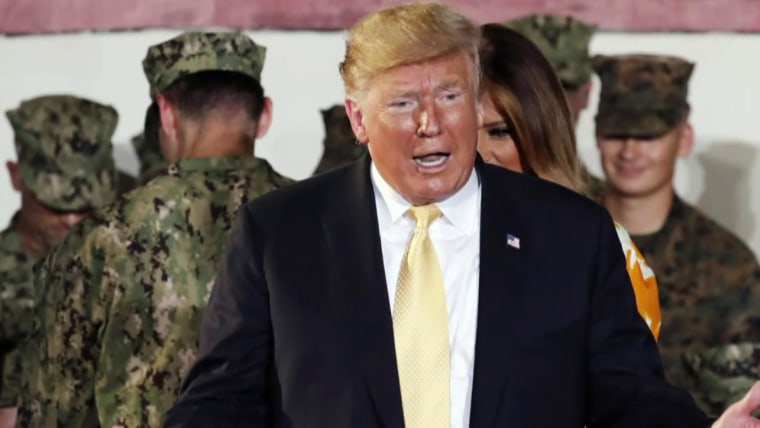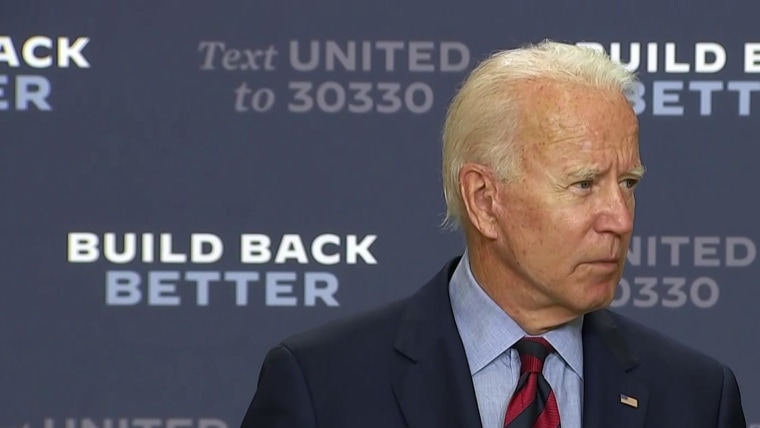Who exactly is President Donald Trump referring to, when he says America’s military dead and injured are “losers?”
My parents married in the spring of 1942. Shortly after the wedding, my father departed as a crew member aboard a Liberty ship heading for Europe. A few months later, my mom received a telegram that his ship had been sunk, and he was missing in action. At roughly the same time, she received a second telegram — her brother’s plane had crashed while returning from a bombing raid in the Pacific. He was badly wounded. In 1950, her youngest brother, a Marine, was wounded multiple times in the Korean War during the Battle of Chosin Reservoir. My older brother served in Vietnam, and my mom’s oldest grandchild later served in both Iraq and Afghanistan. Sadly, he succumbed to post-traumatic stress disorder. He died for his country.
We know, personally, what it really means to sacrifice for your country. Which makes Trump’s criticism of military service so painful.
Service runs in my family — I commanded troops in combat during the first Gulf War. And our story is not unique. My family and millions of other veterans around this country are not “suckers” or “losers.” We know, personally, what it really means to sacrifice for your country. Which makes Trump’s criticism of military service so painful.
Jeffrey Goldberg’s recent article in The Atlantic alleges the president does not agree. Goldberg accuses Trump of rejecting a visit to Aisne-Marne American Cemetery and Memorial in France because he feared the rain would mess up his hair. “Why should I go to that cemetery? It’s filled with losers,” Trump reportedly asked. In a separate discussion, the president reportedly referred to Marines killed in World War I during the consequential Battle of Belleau Wood as “suckers.” Trump slammed the accusations as false, but this story and others have now been largely confirmed by several media outlets including Fox News.
At this critical moment, what the nation needs most is clarity. We need truth. We are tired of being shocked, and tired of yet another cycle of presidential rage and denials.
We want to believe our commander-in-chief wouldn’t say such incredibly offensive things. But we also know, deep down, that it’s likely he did. Because he has before.
Upon reading the Atlantic article I was angry. Sadly, I was not surprised. These allegations are consistent with numerous other comments and actions made by Trump over the past three years that, taken together, demonstrate a clear pattern of disrespect towards the military.
Even before he was elected in 2016, Trump argued that the Sen. John McCain, R-Ariz. was “not a war hero.” He later described McCain, as well as President George H.W. Bush, as “losers” for being shot down in combat. Trump even resisted lowering the flag over the White House when McCain died. In a Pentagon meeting in the summer of 2017, Trump blasted senior military leadership in front of junior officers and civilians as “losers” and a “bunch of dopes and babies.” In the aftermath of this meeting, then Secretary of State Rex Tillerson reportedly referred to the president as “a moron.”
The list goes on. Former Defense Secretary and retired Marine General James Mattis observed that Trump used troops as political props for a photo op in Lafayette Park. Trump criticized Gold Star families and reportedly told the grieving wife of a soldier killed in combat that “he knew what he signed up for.” The president has also denigrated and directly interfered in court-martial actions against soldiers accused of war crimes.
These are not gaffes, nor are they the blunders of a man who simply lacks empathy. Rather, they reveal the president’s basic lack of understanding of the military — and even bigger than that, his lack of understanding of the concept of “service.” This is a man who, in a 1997 interview with Howard Stern, bragged about how avoiding sexually transmitted diseases in the 1960s and 70s was his own “personal Vietnam.”
Trump is, at his core, a figure born of privilege who views people not as individuals, but as pawns. This transactional worldview explains the fact that he simply cannot fathom why anyone would volunteer to serve. It is incomprehensible to him. In Trump’s mind, nothing is worth doing without the possibility of a significant monetary reward or boost in status. As Goldberg notes, after then-chairman of the Joint Chiefs of Staff Joe Dunford had delivered a White House briefing, Trump asked aides: “That guy is smart. Why did he join the military?”
Trump sometimes defaults back to CEO mode when talking about those in uniform, making exaggerated boasts about increased defense spending, rebuilding the military, pay increases for the troops, or improvements to the Veterans Administration. He seems to believe he can purchase the loyalty of his “employees.”
But military culture is not based on dollars. There is a saying amongst officers and non-commissioned officers: ”you can’t b—— the troops.” They can tell when their leadership truly cares about their welfare. The essential question every soldier wants answered is “do my leaders have my back?” And even prior to the Atlantic firestorm, polls showed flagging support for the president among service members as he approaches the November election.
Soldiers and their families appreciate increases in pay. But money doesn’t make up for the president’s apparent lack of interest in reports that Russia was paying bounties to the Taliban to kill Americans, nor can it cover up the fact Trump may have questioned the government’s efforts to find soldiers missing in action because they got caught and thus deserved their fates.
Trump will, of course, continue to deny these accusations. He will spin The Atlantic article as yet another hoax. Former Vice President Joe Biden, for one, isn’t buying it. But American voters must judge the credibility of these very serious allegations and Trump’s denials. Because if you do believe he said these things, you simply cannot vote for him again as our commander-in-chief. This is of critical importance to the nation at a very difficult moment at home and abroad.
Four senior military officers — generals John Kelly, Joe Dunford, James Mattis, and H.R. McMaster — served in senior positions during the past four years. Kelly and Dunford are both particularly knowledgeable about the incidents described in The Atlantic article. Kelly was White House chief-of-staff working at the president’s right hand at the time. Both were in Paris when the president decided not to visit the American cemetery, traveling to it in his place. We need their leadership — and their clarity — now. The stakes are too high to sit this one out. The same sense of duty that has in the past compelled members of the military to stay out of political disputes now demands they speak.
My mother had to undergo one of life’s most difficult experiences multiple times — hugging a spouse, sibling, child, and grandchild and then sending them off to war. Consequently, I am writing this for her.
But I am also writing this for the soldiers who I had the privilege of commanding in peacetime and in war. It is my duty to them as well. These four retired general officers now have a similar responsibility. Their sense of duty to the troops they led in combat, and their families, demands it. Their silence right now is truly deafening.













